PERSPECTIVE: What was post-Soviet Union Russia like in the 1990s?
Seen through the lens of a Singaporean diplomat, who was posted to Russia in late-1993, Chris Cheang reflects on the socio-political and economic crises that the country was going through at that time in the book Life and Work in Post-Soviet Russia.
He shares how his initial reaction to the assignment was one of dismay, given concerns about rampant lawlessness, poverty and high levels of crime in the wake of the Soviet Union's collapse.
After living in Moscow for some time, he found that his attitude towards the country changed.
Cheang served as First Secretary from 1994-1997 during his initial posting to Moscow and subsequently as both Counsellor and Deputy Chief of Mission for his second (1999-2004) and third (2006-2013) assignments to Moscow. He is currently a Senior Fellow with the S. Rajaratnam School of International Studies (RSIS) and has since retired from MFA.
Here, we reproduce an excerpt by Cheang.
Life and Work in Post-Soviet Russia is published by World Scientific and you can get a copy of it here.
By Chris Cheang
Being assigned to Russia came as a rude shock
I had no experience of Russia or its people to form an opinion of the country, one way or another, when I was informed that I was to be sent there.
Based on what I had read about Moscow and Russia in the media (all negative) in the years and months preceding my posting order to Moscow (MFA parlance for written order for an overseas assignment), trepidation, bewilderment, frustration, dismay, shock, and even anger were sentiments which took hold of my very being when I was informed in late-1993 that Moscow was to be my next assignment.
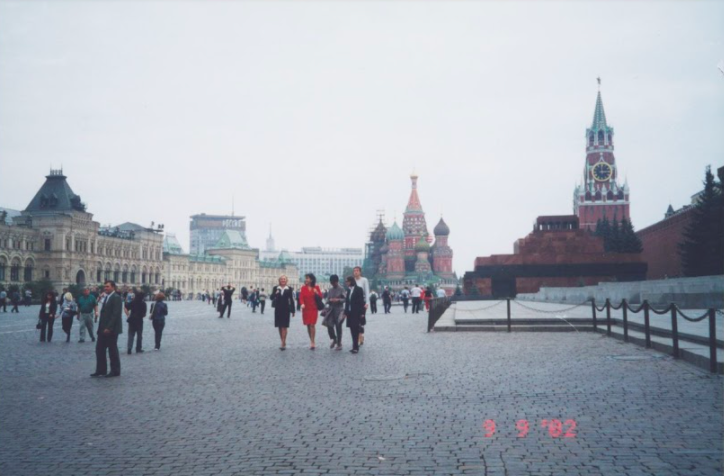 The world-famous Red Square with the GUM (State Department Store) on the left, St Basil's Cathedral in the centre, and Lenin's Mausoleum on the right. Photo courtesy of Chris Cheang.
The world-famous Red Square with the GUM (State Department Store) on the left, St Basil's Cathedral in the centre, and Lenin's Mausoleum on the right. Photo courtesy of Chris Cheang.
It was made crystal clear that Moscow was a “good place” which I regarded with mordant disbelief.
I was told to accept my assignment, that I should discount rumours and the perception that Moscow was a “difficult and dangerous place”, and that I did not have much choice in the matter, in any case.
Moreover, it would have been impolitic of me to reject this “opportunity”. When one is faced with such a Hobson’s choice (which was what I perceived it to be), one naturally must know what answer is expected of one. I sank into the slough of despond.
I did not know whether I would emerge from it, but succeeded in hiding my state of mind from my colleagues.
On the other hand, I was determined not to let my feelings get the better of me, for I desperately wanted to secure an overseas assignment, and if it was to be Moscow, then so be it.
A main concern was high levels of crime
My concern about the assignment revolved around the then widespread perception of Russia as a country riven by lawlessness.
My views on Russia had been shaped by media reports on the country. Images of unchecked organised crime gangs controlling the organs of state and thugs running amok on the streets of Moscow began to fill my imagination.
Poverty and social deprivation and the lack or absence of basic items like toilet paper were said to have been the norm.
My wife and I had to purchase rolls and rolls of toilet paper in Singapore, having been told that this very important item (especially good quality paper) was in very short supply in Moscow!
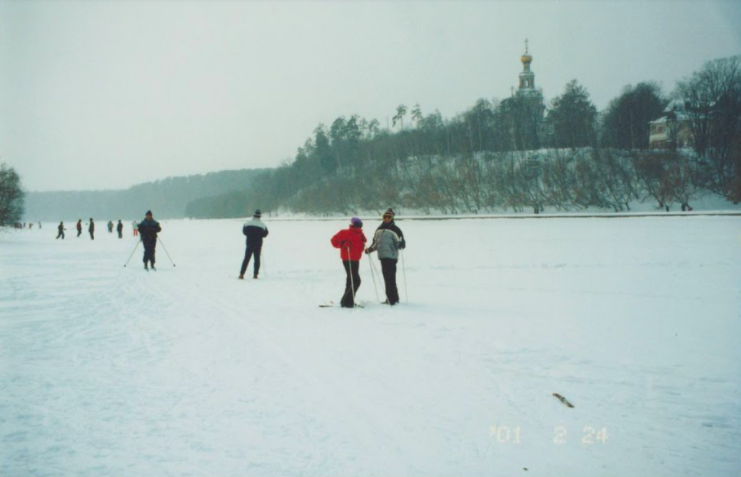 My daughter and wife take a much-needed break from our usual weekend 15- to 20- mile cross-country ski-runs on the frozen Moscow River, and in Serebryany Bor, an enormous forest park, on the left. Note the Orthodox Church's spire in the background (right). Photo courtesy of Chris Cheang.
My daughter and wife take a much-needed break from our usual weekend 15- to 20- mile cross-country ski-runs on the frozen Moscow River, and in Serebryany Bor, an enormous forest park, on the left. Note the Orthodox Church's spire in the background (right). Photo courtesy of Chris Cheang.
While I had a keen interest in Russia’s history and development from an intellectual standpoint, that positive sentiment was not enough to counteract the negative news revolving around the trials and tribulations of life in post-Soviet Russia. Hence, I did not jump for joy about my posting there.
My own prejudices towards the country
I was also seized with an element of unjustified prejudice and preconceived notions about the country.
In the mid-1980s, I had occasion to visit Poland a number of times, East Berlin for a day, and spent some time in Prague and Budapest on holidays. Having observed socialism first-hand in these countries about the bankrupt nature of the Communist system.
And now I was being assigned to Moscow! Although it was plain to me that Russia was no longer run by Communists, I could not help thinking that the country was still gripped by its ideology.
I was at my wits’ end over the fact that I could not argue my way out of the assignment.
The only positive sentiment I had then was the fact that I would be working for Ambassador Bilahari. I knew him well and had the greatest confidence that he would guide and teach me how to navigate the difficulties of life and work in Moscow.
My initial impression of Moscow was mixed
Fortunately, unlike in 1979, this was not post-Soviet Russia of 1994 and I had become a diplomat — they did not treat me like a student I had been 15 years before. In fact, the immigration officers were rather polite, to my surprise and delight.
The long drive to the students’ hostel in MGU (Moscow State University) was not one to brag about. I had no choice but to stay in a hostel; while I carried a diplomatic passport, I was not yet accredited to the country since officially, my responsibilities as a diplomat were scheduled to commence only in August 1994.
However, I did not have a problem with having to stay in a hostel. It would offer me more opportunities to mingle with fellow students and learn the language fast — that was my reasoning.
It was just as well that my family was spending time duration of my language course; they would not have been able to live comfortably with me in the hostel.
The broad avenues and wide streets which led to MGU were dark, and whenever they were lit, only cast slight rays of light (for the most part, the lampposts were either out-of-order or simply turned off).
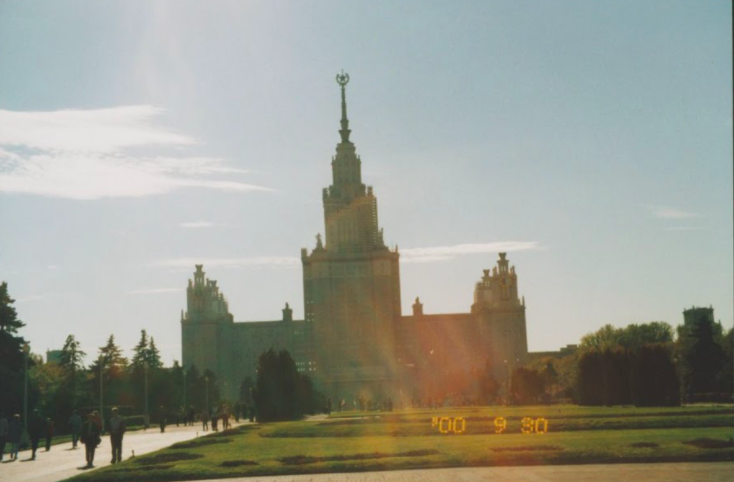 MGU early in the autumn. On its huge grounds, my family and I would cross-country ski in winter, in summer and autumn, we would also enjoy many a stroll. I would also cycle on its miles of paved and broad streets in summer. Photo courtesy of Chris Cheang.
MGU early in the autumn. On its huge grounds, my family and I would cross-country ski in winter, in summer and autumn, we would also enjoy many a stroll. I would also cycle on its miles of paved and broad streets in summer. Photo courtesy of Chris Cheang.
Russia was experiencing a political and socio-economic crisis
My Embassy colleague enlightened me on the situation, remarking that the country had found itself in a political and socio-economic crisis and could not spare the necessary funds for street-lighting — that comment only added to my sense of gloom and doom about my new “life” in Moscow.
Thoughts raced through my mind — was this what Russia had become, so bankrupt that it could not even afford to light the main streets of its capital?
If that was the case, then its people were probably not living lives of ease and plenty. My family and I would live better but rather isolated lives in the midst of poverty, a thought which was rather uninviting to me.
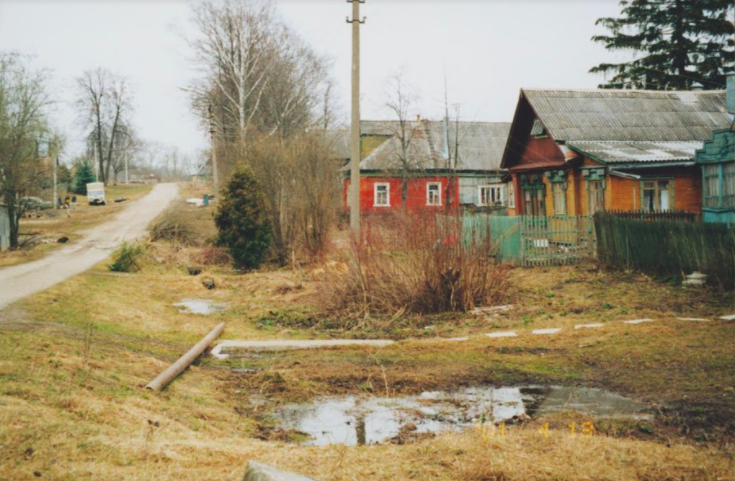 A typical Russian house in the countryside outside Moscow. It could be sparse, like the one in this photo, or luxurious. Most were quite modest. Photo courtesy of Chris Cheang.
A typical Russian house in the countryside outside Moscow. It could be sparse, like the one in this photo, or luxurious. Most were quite modest. Photo courtesy of Chris Cheang.
Conditions in my hostel also caused me to question my presence in Moscow. My small room was dirty while the common loo (rather maladorous) was situated perhaps 30 yards from my room.
Added to that was the fact that the food in the cafeteria was neither to my taste nor attractive to bestow one’s eyes upon (my ingrained prejudices were expressing themselves, not any sense of objectivity, I admit).
Not having any cooking skills meant that I was dependent on the cafeteria.
However, I was blessed with probably at the time huge monetary resources, compared to my fellow Russian-language and students from other disciplines, not to mention the average man-in-the-street.
With my salary and allowances, I could afford to eat out often in the then few reasonably-priced restaurants in town. That I did, thrice a week.
Whenever I ventured out of the hostel to patronise these restaurants, the dezhurnaya (invariably a matronly woman acting as a watchman in a hostel), would warn me of the dangers lurking on the streets after dark.
Street crime rates were high in 1994 and the years thereafter but thankfully, I did not fall victim to any thugs. Once-in-a-while, some kind South Korean students with whom I shared the common kitchen, would take pity on me and invite me to share their well-cooked and tasty meals.
My attitude to the country began to change once I started learning Russian
My whole attitude and sentiments towards Moscow underwent a change as soon as my Russian language course started.
Thanks to Mr. P, I absorbed all the Russian language terms for those monumental changes in the society and as a result, my command of the language grew in leaps and bounds, although it was still far from fluent.
Today, I can read, write, and comprehend it at the advanced level, having taken part-time lessons in the language during my first, second and last tours of duty in Moscow. For this, I must thank Mr. P, as he provided me the basis for all that.
The need to focus and learn the language meant that I had to rid myself of the prejudices and preconceived notions of my host country. And when one learns a language, one also absorbs the culture of that language and, in the process, appreciates its richness and qualities.
Moreover, my three-month stint as a language student gave me insights into and an experience of life in the Russian capital through contact with Russian and foreign students in MGU, where Russian was the lingua franca.
Truth be told, I had little contact with other foreign students for I did not think I would improve my command of the language by communicating with non-native speakers of the language.
Hence, almost from the start of my stay in Moscow, I tried to have more contact with Russians or foreigners who spoke the language fluently viz. those from the former Soviet republics.
The hostel was also a great location to practise Russian
Since my teacher was assigned to me by MGU on a one-to-one basis, my contact with other students was also not to be taken for granted.
Fortunately, the hostel would organise regular parties which I would attend as often as my mood and my schedule would allow.
At this party (whose dates were not fixed and occasionally, no party was organised at all), one would meet one’s fellow students from Russia, the former Soviet republics, South Korea, China, and Europe as well as North America, not only to socialise but more so to practise one’s command of the Russian language with its native speakers.
From the Russian and former Soviet republics’ students, I would also learn some of the subtleties and nuances of the Russian language as well as Russian social mores.
The then Ambassador, Bilahari Kausikan, would thankfully have me over to his Residence to meet his contacts, Russians and non-Russians.
They would answer all my questions about the country and with the Russian guests, also provided me the opportunity to practise the language.
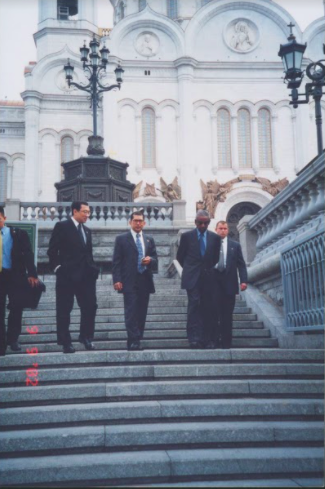 Professor S. Jayakumar, then Singapore’s Foreign Minister, on his first visit to Russia in September 2002. Here he is seen with me (in the middle) and Bilahari Kausikan, Second Permanent Secretary (of the Foreign Affairs Ministry), to my right, descending the steps of the Cathedral of Christ
Professor S. Jayakumar, then Singapore’s Foreign Minister, on his first visit to Russia in September 2002. Here he is seen with me (in the middle) and Bilahari Kausikan, Second Permanent Secretary (of the Foreign Affairs Ministry), to my right, descending the steps of the Cathedral of Christ
the Saviour. It served as a swimming pool during the Soviet period; it was rebuilt and restored after the Soviet era. Photo courtesy of Chris Cheang.
I also took the opportunity to see as much of Moscow as possible
Moreover, I took the opportunity to see and experience as much of Moscow as possible.
Being a student on a generous MFA allowance meant that I did not have any work responsibilities and hence, more than enough time and more important, the means to indulge myself in the large city’s many distractions, principally eating out in restaurants which, at the time, were quite limited in number.
All-in-all, I certainly must have been one of the very few financially-blessed students in MGU that summer of 1994. Being in that very unenviable position, I became to some extent, the cynosure of the less fortunate students (financially-speaking) with whom I became acquainted while at MGU.
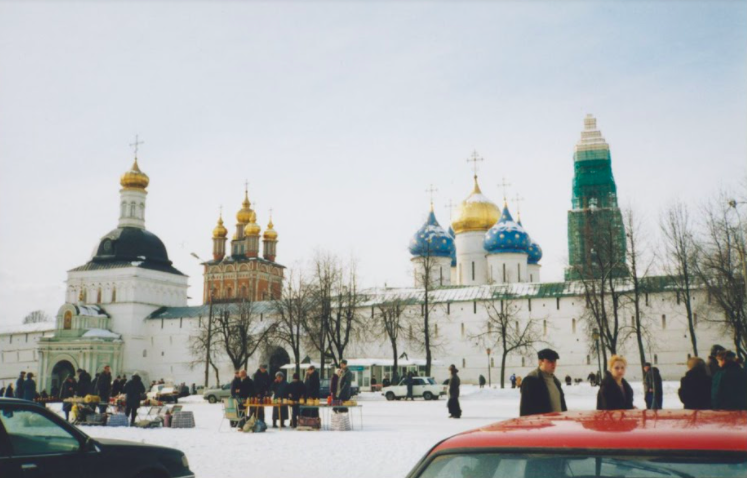 Outside the monastery grounds of Sergiev Posad, Russia's spiritual centre. It attracted many Orthodox faithful as well as tourists, domestic and foreign. All first-time visitors to Moscow must visit it. Photo courtesy of Chris Cheang.
Outside the monastery grounds of Sergiev Posad, Russia's spiritual centre. It attracted many Orthodox faithful as well as tourists, domestic and foreign. All first-time visitors to Moscow must visit it. Photo courtesy of Chris Cheang.
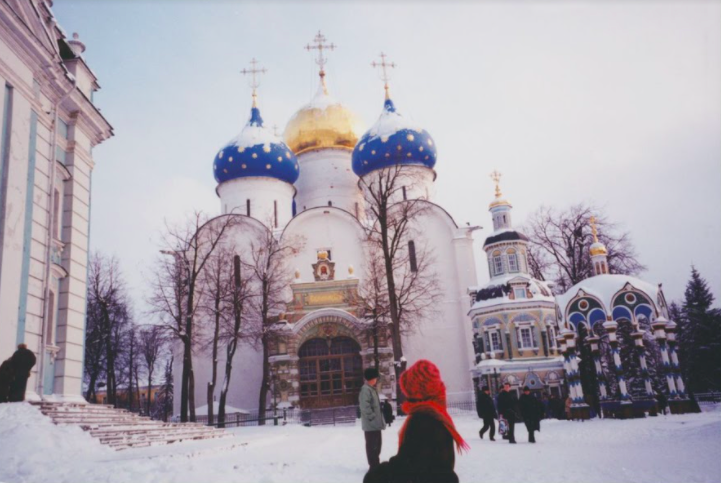 Assumption Cathedral of the Trinity Lavra of St. Sergius in Sergiev Posad. Inside are wonders to be seen. Photo courtesy of Chris Cheang.
Assumption Cathedral of the Trinity Lavra of St. Sergius in Sergiev Posad. Inside are wonders to be seen. Photo courtesy of Chris Cheang.
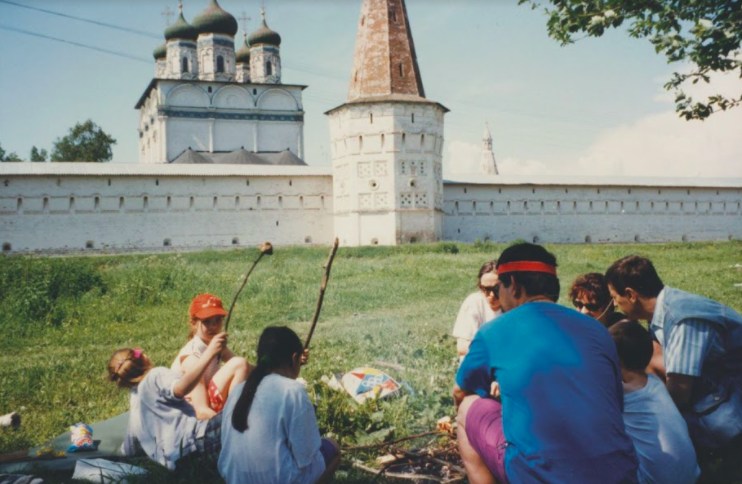 My family members with an American expat’s family enjoying a barbecue by a small town in the
My family members with an American expat’s family enjoying a barbecue by a small town in the
Moscow region; note the small kremlin (citadel) and a church within. An engineer in a US telecommunications company, he was one of quite a few foreigners who worked in Moscow in the 1990s and 2000s. Photo courtesy of Chris Cheang.
I found that Russians are a warm and hospitable people
The first six to 12 months of my stay in Moscow also opened my eyes to the Russian character.
I came to the conclusion that Russians are very generous, hospitable, and kind even to strangers/outsiders to whom they take a liking. What they then lacked in material possessions, they more than made up by their high degree of friendliness, kindness, hospitality, and basically human touch.
I experienced that first-hand in MGU in the persons of two Russian students — unfortunately, I cannot recall their names. They were poor students, a young married couple, who lived in a small one-room flat in the hostel while Yours Truly had two rooms, one of which was en-suite.
They invited me once or twice to their room for dinner, and shared with me their meagre portions of meat and vegetables. I would naturally respond to their kindness but since I do not know how to cook, would invite them to restaurants.
They would always express their gratitude but would not accept my invitations. They became my first acquaintances in Moscow; they would correct my command of spoken Russian and answer all my questions about politics, their lives, Russia’s history, and so on.
To this day, I regret not having continued my contact with them after I started work in the Embassy.
The people who helped me tremendously during this time
My Russian language teacher, Mr. P, was also a paragon of Russian hospitality, kindness, understanding, and openness. He would often insist on paying for a cup of tea or coffee during our breaks between lessons, although his salary was a pittance.
Unfortunately, I lost contact with Mr. P as well after assuming my post in the Embassy. I regret that to this day as well.
Finally, thanks to Ambassador Kausikan, I had the opportunity to visit a Russian household (my first) and partake of its owner’s hospitality— Mr. O was an old friend of Ambassador Kausikan, an academic whose expertise was China. (He had learnt Mandarin in the 1970s in Nantah, Singapore’s only Chinese language university at the time.)
This kind and gentle individual went to great lengths to provide his two guests with more than enough food and drink. It was a very touching experience for me which I shall never forget.
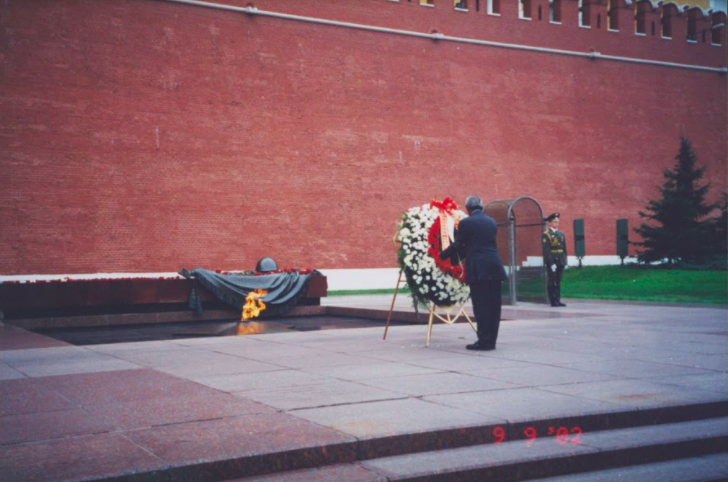 Professor Jayakumar laying a wreath at the Tomb of the Unknown Soldier, a war memorial dedicated to the Soviet/Russian troops who fell in World War II. Photo courtesy of Chris Cheang.
Professor Jayakumar laying a wreath at the Tomb of the Unknown Soldier, a war memorial dedicated to the Soviet/Russian troops who fell in World War II. Photo courtesy of Chris Cheang.
Top photos courtesy of Chris Cheang
If you like what you read, follow us on Facebook, Instagram, Twitter and Telegram to get the latest updates.
